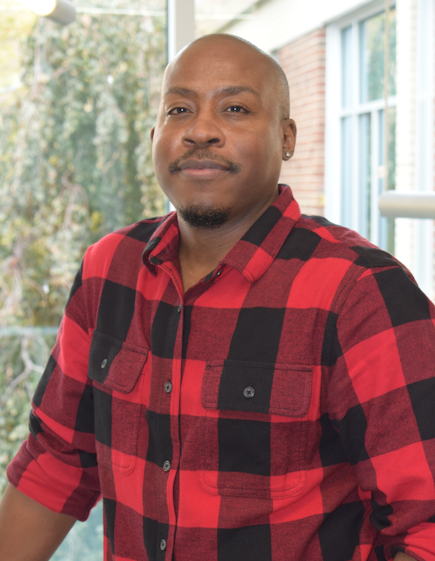Leading the charge: Social Work Assistant Professor Bakari Wallace champions Black male initiatives
Bakari Wallace’s path to becoming an assistant professor at the Wayne State University School of Social Work is one marked with unexpected twists and self-discovery. After earning his bachelor's degree in advertising and marketing communications at Wayne State, Wallace initially set out to enter the music industry. When that didn’t materialize, Wallace found new direction through his mother’s suggestion to volunteer with formerly incarcerated individuals. That experience ignited his passion for community work — a path he was destined for, having grown up in an environment rooted in service.
 “It just clicked! It was sort of like how actors talk about catching the acting bug,” Wallace said. “That’s the best analogy I can use. I believe things clicked in part because that’s where I come from – community work – that's the home that I grew up in.”
“It just clicked! It was sort of like how actors talk about catching the acting bug,” Wallace said. “That’s the best analogy I can use. I believe things clicked in part because that’s where I come from – community work – that's the home that I grew up in.”
Around that time, Wallace attended an event hosted by the United States Social Forum, a series of gatherings of social justice activists which brings together politically progressive activists, organizers and people of color to build unity around common goals of building a broader social justice movement. The event proved to be the next step on the path to Wallace’s career in social work.
“I don’t know why, but something told me to go over and fill out a card from the University of Michigan School of Social Work. When the student services director called me and said, ‘Let’s talk,’ that was it. I got into UM and the rest was history.”
A pivotal moment is his career development was during his practicum as a master’s student at UM. He was placed in the neighborhood of Brightmoor on Detroit’s west side, one of a few neighborhoods where he resided during his childhood, to work with the Brightmoor Alliance, where he addressed chronic absenteeism among students. He said that the experience further reinforced that he was on the right path.
This is why I’m here on this earth – to do this kind of work. This is my purpose. – Social Work Assistant Professor Bakari Wallace
He completed his master’s at UM in 2014 and earned a Ph.D. in human ecology from the University of Wisconsin-Madison in 2021, becoming a fellow in Wayne State’s Pathway to Faculty Program later that year. Wallace still stays in contact with the student services director who introduced him to the field and credits his many faculty mentors at the School of Social Work, for making him feel welcome and giving him the confidence to excel in his new role. He is especially looking forward to working with graduate students and stepping into the mentor role.
“Our students are so smart and so hungry, and I almost hate to say it because the word is overused, but they inspire me,” Wallace said of his students. “They definitely feed my sense of purpose and I’m excited to learn from them and with them because they bring so much to the table. Teaching scares me, but I love it. I love it.”
Wallace looks forward to continued work with School of Social Work academic advisors Geoffrey R. Jones and Lawrence Robinson on the Black and Latinx Males in Social Work initiative, which aims to expand the diversity of students in the School of Social Work and in the profession.
“Dr. Wallace is an amazing activist scholar who brings passion for social change to his work,” noted WSU Social Work Dean and Professor Sheryl Kubiak. “He is an asset to the School of Social Work and the community we serve.”
Wallace's research explores how racial-structural paradigms like antiblackness shape the experiences of Black men and boys. His dissertation examined the link between personal histories of a select group of Black fathers, their perceptions of how society views Black men, and how they approach the racial socialization of their children.
As an interdisciplinary scholar, Wallace's interests extend to the effects of mass incarceration on the Black community, police and prison abolition, Black youth civic participation, Black radical social movements, and historical methods of Black radical community organizing.
Wallace, who operates at the cross section of Black studies and social work is especially excited for the possibilities that will come with the launch of the Detroit Center for Black Studies, a faculty-led multidisciplinary center at Wayne State that connects faculty from institutions across the state of Michigan. A $6 million grant from the Mellon Foundation will support the center and will provide funding for hiring 30 new humanities faculty, advancing the university’s work to build “a more inclusive and equitable university by prioritizing faculty and research centered on the Black experience.”
Wallace’s work aligns closely with Wayne State University’s Prosperity Agenda, which focuses on driving student success, ensuring community impact, and fostering innovation. His research and advocacy for Black men and boys, and his passion for community work, directly contribute to building a more inclusive and equitable environment—a core value of the initiative. By addressing racial and structural inequities, Wallace’s efforts tie into the university’s mission to support Detroit communities and develop innovative solutions that uplift marginalized populations.
“I'm genuinely excited for the possibilities of what these initiatives can do,” he said. “Not just for Wayne State, but for the city and particularly for Black scholars like me.”
Writer: Sarah Freeman and Editor: Betsy Vanderstelt